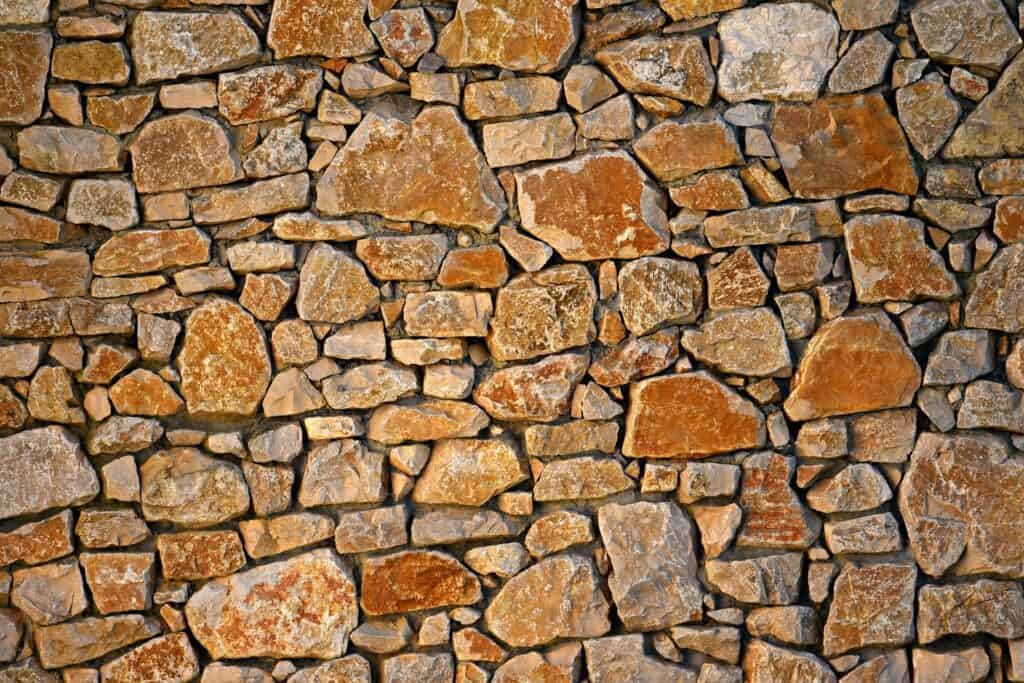The Rock Wall
– Nonfiction by Emily Zarevich –

It was another one of my Dad’s many projects that never materialized. I know that now, looking back. I also know that I’m in no position to judge him.
I’m a chronic procrastinator myself, in my adulthood. I have an ever-thickening stack of unfinished poems, short stories, and could-this-become-a-novel chapters crammed into my desk drawer. An evil, impish demon whispers “You can always do it tomorrow” with a nasally little voice whenever I even consider pulling something out to work on. Dirty dishes pile up on me too. Laundry goes unfolded, counter tops unwiped. My bathroom walls need to be repainted, but I haven’t even picked out a colour yet, let alone pick up a brush. Occasionally, I even forget to pay a bill.
And yet, years ago, I was an anxiety-ridden mess of a child who couldn’t even fathom the idea of leaving something unfinished. I was convinced that real, grownup life was just like school, where every assignment, every project, every worksheet had to be handed in on time and in full or else you got an F, and the teacher called your house. My elementary school was strict. Nothing, absolutely nothing, could ever be late, or else it was stamped on your report card and on your subconscious forever. The idea of abandoning a project just wasn’t something my perfectionist, teacher-pleasing student’s mind could comprehend, so I was confident that my Dad’s rock wall would be built eventually. He had to build it, or else…well, I wasn’t sure who would call the house. The adult-ing police, perhaps?
Our summer cottage sat on a steep, mossy hill overlooking a narrow crescent court of green-brown water, spreading out into the wider bowl of the lake. Dad wanted to build his wall at the very bottom of said hill, down which a set of ancient, creaky, half-rotten wooden stairs descended like rollercoaster tracks from the foot of the cottage to the lakeshore It would be built about ten feet away from where the water hit the land, stretching across our property until it reached the very tips of the neighbours’ territory on both sides. It would not be made of cement or planks of wood, though. Dad wanted rocks. And not just any rocks would do. The rocks my Dad wanted—hard, strong, sturdy rocks—could only be found at the bottom of our lake. Nature’s Home Depot, I call it now, because it had all the building materials Dad wanted. The rocks it produced were the perfect size and had a nice, solid oval shape. Best of all, they were free and his for the taking, because who else on our lake needed rocks for a wall? No one.
Rome wasn’t built by one man, though. And a humble rock wall couldn’t be raised from the ground up by a single person either. Dad had other important duties that kept him from gathering rocks, like repainting the outside of the cottage, fixing the smoky, unreliable barbecue, driving all of us into town for ice cream, rushing out for Benadryl when the mosquito bites trumped the medicine cabinet stock, and burning all the debris that he and my former farmhand grandfather could get their hands on, including, once, an entire chair. And I mean the whole chair, not sensibly chopped into bits, but burned in one single piece. I can still hear Mom and Grandma’s screams as the chair was swallowed whole by explosive flames that threatened, sinisterly, to lick the cottage walls. It was like one of my mean-spirited elementary school classmates licking something so that no one else could touch it ever again. The cottage only narrowly survived because Dad had the good sense to hose it down while the bonfire lived and partied hard and died.
Poor Dad was completely booked. So, to help him out, I took it upon myself to become a professional, certified rock hunter. I recruited as many people as I could to join me in my enterprise. Thus, Rock Hunters Inc. (as we called it then) was born, and though we didn’t offer a salary, a pension plan, or dental coverage, we still dedicated ourselves wholeheartedly to the challenge set before us. Why did we do it? For fun, I suppose, and purpose. Our brains were disconnected from the routine of school and homework and we needed to plug them in elsewhere, even if the only outlet available was a small and improbable architectural scheme.
So, during our summers at the cottage, me and my cousins and my friends who visited made it our personal mission to collect as many rocks from the lake as we could, for the wall that would never happen. If you asked any of us today if it was worth all that effort, all those wet and strenuous hours plunging under, we’d probably say no, of course not, but it’s different when you’re a kid. When you’re that young, and bursting to a breaking point with undirected energy, you’re grateful for any activity that makes you feel accomplished.
We had a system set up. One or two people were drivers, of the wobbly old paddleboat with chipped blue paint, and one or two people were divers. There were always arguments about who got to be what, with rock-paper-scissors providing the method of resolution each time. If you lost rock-paper-scissors, you were a driver. If you won, you dove. It was as simple as that. Luck and chance, not skill. It gave us an early taste of what adult life would be like.
After the goggles were strapped on and deep breaths were taken, down the divers went. Once you were down, you had to feel around the mushy floor of the lake for what you wanted. You had to shove your hands right in there if you had to, because like every child’s toy box, or every bag of McDonald’s French fries, the best stuff was at the bottom. Flakes of mud and weeds flung up in our faces as we searched, splattering our goggles and occasionally getting into our mouths. If a fish came close, the standard procedure was to freak out, scream, come up gasping for air, and then, after being taunted and laughed at by the others, dive down again. It was all worth it when you finally felt the rough, bumpy exterior of a well-formed, ideally-sized rock. Small enough to lift, but big enough to impress.
One tug, two tugs, and out came your prize! Then came the fun part of hauling it into the back of the paddleboat.
“Don’t scratch up the boat!” I can still hear my Mom call out to us. Her expectations were unrealistic. We paid them no heed. Besides, the paddleboat was already all scratched up. Our cottage’s previous owners had left it behind, along with a rocking chair that squeaked like a bird. That was cottage country generosity at its finest. What you got was usually used and battered and mouldy and gross, and you just smiled your big polite Canadian smile and chirped, “Thanks!”
Each day’s revenue usually amounted to about ten rocks, sometimes up to fifteen, and the diver who’d collected the most rocks got bragging rights. At the end of each afternoon, we stacked our rocks in tall, neat piles near the shore and called it a job well done. Then, we ran up those rickety stairs to the cottage for nachos or popsicles, because rock-hunting was hungry work. How many rocks did we collect altogether? I can’t tell you. Perhaps those rocks are still there, little Egyptian pyramids piled high. If you ever end up renting or buying my old cottage, you can count them yourself.
But I know there were many, many, many rocks, because I can’t even begin to count the sweltering summer afternoons we spent out there, diving and searching, tugging and hauling, swimming and paddling back to shore. The fruits of our labour were our burned shoulders, the red goggle imprints around our eyes, and my Dad’s soaring praise, though he never did anything with the rocks we worked so hard to find. He never did build that wall. And nobody called home about it either.
About the Author – Emily Zarevich

Emily R. Zarevich is an English teacher and writer from Burlington, Ontario, Canada. She has been published previously in Understory Magazine
and Living Education.

Dreamers Writing Prompt Generator
Experience the power of simplicity with our unique writing prompt generator. Designed for writers who crave spontaneity and surprise, our tool delivers one meticulously crafted prompt at a time.

Top 25 Most Popular Manga Right Now
If you’re searching for the most popular Manga right now, this top 25 list is the ideal starting point, whether a beginner or enthusiast.
Did you like this story by Emily Zarevich? Then you might also like:
Count
Denise
Exploring Canyons
His Beautiful Death
Diamond in the Sky
Like reading print publications? Consider subscribing to the Dreamers Magazine!